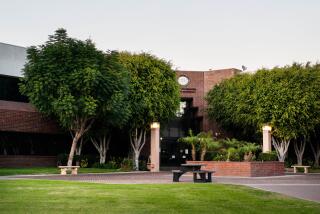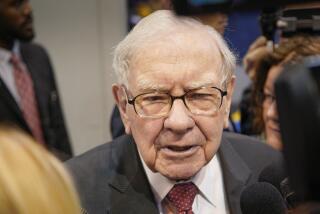Dr. Thomas W. Langfitt, 78; Neurosurgeon Expanded Scope of Pew Foundation
- Share via
Dr. Thomas W. Langfitt, a former neurosurgeon who turned the once-secretive Pew Charitable Trusts into a foundation of national renown, died Sunday at his home in Wynnewood, Pa. He was 78.
The cause was miliary tuberculosis, according to his son Frank.
Langfitt was a neurosurgeon and researcher for more than three decades and attained international prominence for his pioneering work in the treatment of traumatic head injuries.
He headed the University of Pennsylvania’s neurosurgery department for two decades before becoming president in 1987 of Philadelphia-based Pew, one of the nation’s richest philanthropies, which distributes millions of dollars a year to advance the arts, science, education, journalism and environmental concerns.
He was credited with greatly expanding the scope of Pew’s grant-making and emphasizing accountability to its stakeholders with a bottom-line approach that influenced foundations throughout the country.
“He remolded Pew from a tightly knit family affair to a philanthropic institution of visibility and national impact. And his work to increase the transparency of Pew’s activities set a marker for many other foundations, as did his emphasis on evaluation as a critical measure of effectiveness and of whether a foundation’s dollars were being maximized,” said Dorothy S. Ridings, president and chief executive of the Council on Foundations in Washington, D.C.
“He always asked, have we delivered the largest good we could for the public?” said Rebecca Rimel, Pew’s chief executive, who knew Langfitt for 25 years.
A native of Clarksburg, W. Va., Langfitt was the son of a civic-minded general surgeon. Langfitt accompanied his father on house calls, which exposed him to the deprivations experienced by patients so poor they could offer only food as payment.
“I think that experience really informed my dad’s sense of service,” said Frank Langfitt, a correspondent for National Public Radio in Washington, D.C.
Langfitt earned a bachelor’s degree in biology from Princeton University in 1949 and a medical degree from Johns Hopkins School of Medicine in 1953. After serving two years as an Army doctor, he moved to Philadelphia and by 1961 was head of neurosurgery at Pennsylvania Hospital.
In 1968, he became the Charles Harrison Frazier Professor of Neurosurgery at the University of Pennsylvania. The author of more than 200 publications, he also headed the editorial board of the Journal of Neurosurgery for 10 years beginning in 1971 and founded a brain injury research center at the university that is now in its 35th year.
He made a major contribution to his field through research on drugs and surgical procedures for the management of swelling in the brain, the most common cause of death in neurosurgical patients in the 1960s.
“He was instrumental in developing all of the modern techniques we now use for treatment of patients with traumatic brain injuries,” said Dr. Sean Grady, chief of neurosurgery at the University of Pennsylvania hospital.
“The bottom line is the reduced rate of death from brain injury. It was 50% when he started his work; now it’s in the 25% range. He played a major role in helping that to occur,” Grady said.
Much of Langfitt’s research involved experiments in which baboons were subjected to fatal head injuries in a university laboratory. The work attracted the wrath of animal rights activists, whose allegations of cruel and inhumane treatment led to a suspension of the experiments in 1985.
Grady said the controversy was discouraging but not the main reason for Langfitt’s move to Pew a few years later.
“He was always interested in different things, in a Ben Franklin way,” Grady said. “He was a scientist-philosopher and an economist in certain ways. He was interested in literature and the arts ... and the role the foundation could play in changing the way society views some of its problems.”
The Pew Charitable Trusts had been founded by the heirs of Sun Oil Co. chief Joseph Newton Pew in 1948. For the first few decades, the foundation made grants anonymously and concentrated its philanthropy in Pennsylvania.
Langfitt, who had been a Pew board member since 1979, sought to push the organization toward projects with national impact. He championed programs that targeted early childhood development, healthcare reform and the environment. He was especially passionate about improving the foster care system and expanding pre-kindergarten education.
By the time he stepped down as president in 1994, Pew was the nation’s fifth-largest foundation. Today, it is the third largest, after the Ford and Kellogg foundations, with annual grants of more than $200 million.
Until 1997, Langfitt also headed the Glenmede Trust Co., the investment bank established by the Pew family to fund its endowments.
After retiring from Pew and Glenmede, he started a third career in 2002 as president of the College of Physicians of Philadelphia, a 200-year-old nonprofit cultural and educational society. He launched a major initiative called Philly Health Info, which combines an interactive website with personal assistants to improve communication between doctors and patients.
He retired from the college in 2004.
In addition to his son Frank, Langfitt is survived by his wife of 53 years, Carolyn Payne Langfitt; sons David of Bryn Mawr, Pa., and John of Rochester, N.Y.; a brother, a sister and eight grandchildren.
More to Read
Sign up for Essential California
The most important California stories and recommendations in your inbox every morning.
You may occasionally receive promotional content from the Los Angeles Times.














